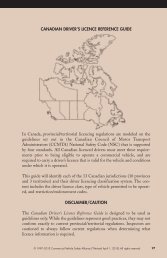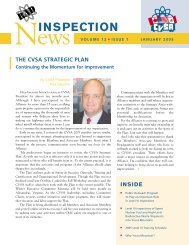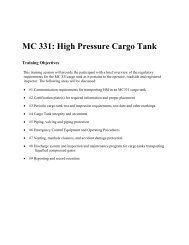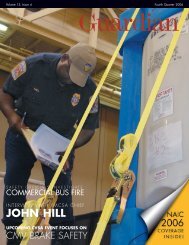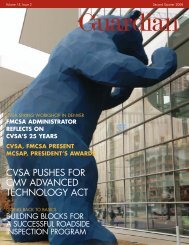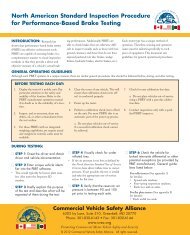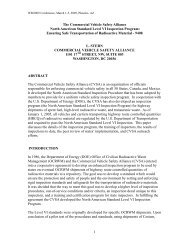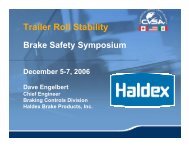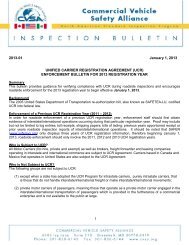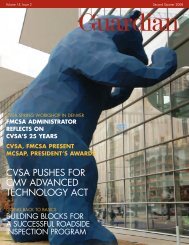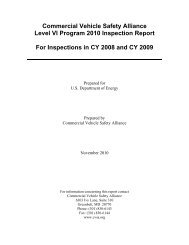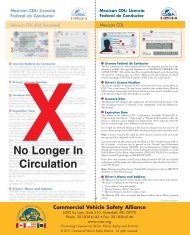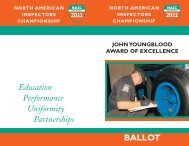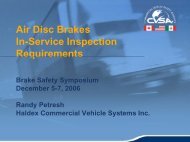inside cover - Commercial Vehicle Safety Alliance
inside cover - Commercial Vehicle Safety Alliance
inside cover - Commercial Vehicle Safety Alliance
Create successful ePaper yourself
Turn your PDF publications into a flip-book with our unique Google optimized e-Paper software.
Guardian<br />
F E D E R A L N E W S<br />
NTSB Adds Technology-Driven Collision<br />
Avoidance to Most Wanted List<br />
By The National Transportation <strong>Safety</strong> Board<br />
Emphasizing that developing<br />
and installing new technologies—such<br />
as adaptive<br />
cruise control and collision<br />
warning systems—in commercial<br />
trucks, buses, and<br />
passenger vehicles will substantially<br />
reduce accidents,<br />
the National Transportation<br />
<strong>Safety</strong> Board (NTSB) added<br />
highway vehicle technology<br />
to its Most Wanted List of<br />
Transportation <strong>Safety</strong> Improvements.<br />
The Most Wanted List,<br />
established in 1990, focuses<br />
attention on NTSB safety<br />
recommendations that have<br />
a high public profile and<br />
will save lives and reduce<br />
injuries.<br />
At a public meeting last<br />
November, the NTSB<br />
reviewed its list and added the goal of<br />
preventing highway collision with<br />
enhanced vehicle safety technology. The<br />
NTSB is urging the National Highway<br />
Traffic <strong>Safety</strong> Administration (NHTSA)<br />
to act more quickly in setting performance<br />
standards and mandating collision<br />
warning and adaptive cruise control systems<br />
in new commercial and passenger<br />
vehicles.<br />
“I can’t think of any other set of technologies<br />
that holds as much potential for<br />
improving motor vehicle safety as these do,”<br />
NTSB Chairman Mark V. Rosenker said.<br />
In a two-year period, the NTSB<br />
investigated nine rear-end collisions in<br />
which 20 people died and 181 were<br />
injured. Three of the accidents involved<br />
buses and one accident involved 24 vehicles.<br />
Common to all nine accidents was<br />
the rear-following vehicle driver’s<br />
degraded perception of traffic conditions<br />
ahead before striking other vehicles. The<br />
NTSB said these accidents did not<br />
involve the use of drugs, alcohol, or vehicle<br />
mechanical defects. The investigation<br />
showed that sun glare,<br />
fog, smoke, fatigue, distractions,<br />
and work zones interfered<br />
with a driver’s ability<br />
to detect slow-moving or<br />
stopped traffic ahead and<br />
resulted in rear-end collisions.<br />
The NTSB cited U.S.<br />
Department of Transportation<br />
preliminary analyses<br />
that have shown that<br />
1,836,000 police-reported<br />
crashes, or about 48 percent<br />
of accidents, could be prevented<br />
by rear-end or runoff-the-road<br />
and lane<br />
change collision warning<br />
systems.<br />
The NTSB said that<br />
NHTSA, along with its<br />
cooperative partners—the<br />
FHWA, the FMCSA, and<br />
RITA—appears to be working consistently,<br />
although slowly, on these technological<br />
safety issues. The preliminary<br />
results of the testing on advanced safety<br />
systems are encouraging, but rulemaking<br />
is needed to ensure uniformity of system<br />
performance standards, such as obstacle<br />
detection, timing of alerts, and human<br />
factors guidelines, on new passenger and<br />
commercial vehicles, according to the<br />
NTSB. The complete Most Wanted List<br />
is available on the NTSB website:<br />
wwww.ntsb.gov<br />
A full copy of FMCSA’s 2006-2011 Strategic Plan is now available online at www.fmcsa.dot.gov.<br />
Printed copies made be obtained by writing: FMCSA, Office of Policy Plans and Regulation (Attention: Chris Chavez) W64-231,<br />
1200 New Jersey Ave., SE, Washington, DC, 20590. Email: christopher.chavez@dot.gov Phone: 202-366-6408.<br />
11



